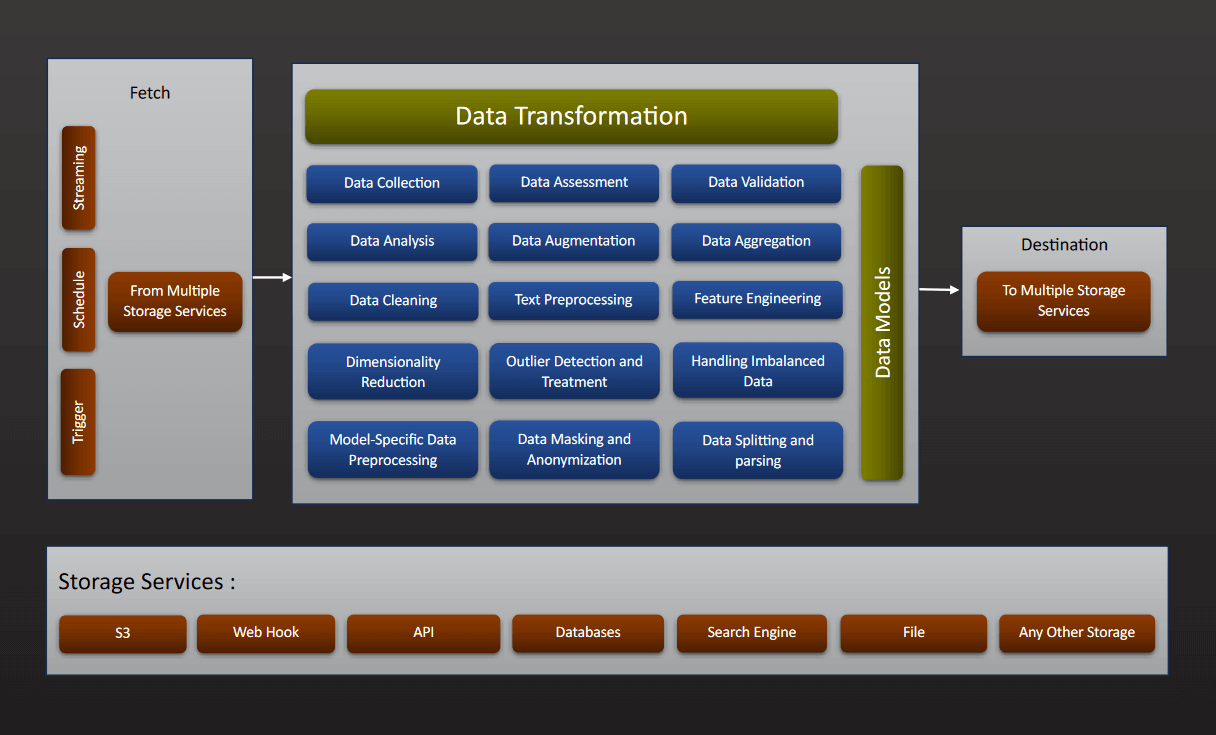


At Tadhak Technologies, data transformation stands as a cornerstone in our quest for operational excellence and informed decision-making. With a focus on converting raw data into actionable insights, we embark on a journey of refinement, ensuring that every piece of information we gather serves a purpose. Through meticulous stages of extraction, cleaning, validation, and enrichment, we mold data into a cohesive and reliable asset, ready to drive efficiencies and foster innovation across our organization. Join us as we unlock the power of transformed data to propel our business forward into the realm of possibility.
Convert Data Types: Convert data types to ensure consistency and compatibility for analysis.
Perform Feature Scaling or Normalization: Adjust feature scales to make different features comparable, or normalize data to fit within a specific range.
This involves converting data into a consistent format or scale, such as converting dates into a standard format or scaling numerical values. It helps to ensure consistency and comparability of the data.
Pivot Tables or Reshape Data: Restructure data to facilitate analysis, such as converting rows to columns or aggregating data.
Merge or Join Datasets: Combine data from multiple sources based on common identifiers or keys.
This involves combining data from multiple sources or tables based on common fields or keys. It helps to create a unified dataset that includes information from different sources.
This involves selecting and extracting specific subsets of data based on certain criteria or conditions. It helps to focus on relevant data and remove unnecessary information.
Identify Data Sources: Determine where the data resides, whether it's in databases, files, APIs, or other sources.
Acquire Raw Data: Extract data from the identified sources, ensuring to gather all necessary datasets for analysis.
Check Data Completeness: Assess whether all expected data records are present.
Assess Data Quality: Identify issues such as missing values, duplicates, outliers, and inconsistencies that may affect data integrity.
Confirm that data transformations and calculations have not introduced errors or inconsistencies.
Verify Transformations and Calculations: Ensure that data transformations accurately reflect the intended changes and produce expected results.
Perform Analysis on Cleaned Data: Apply statistical or machine learning techniques to derive insights or make predictions from the cleaned and transformed data.
This involves removing or correcting any errors, inconsistencies, or missing values in the data. It ensures that the data is accurate and reliable for analysis.
This involves combining multiple data points into a single value, such as calculating sums, averages, counts, or other statistical measures. It helps to summarize and condense the data for analysis.
This involves breaking down a single data field into multiple fields or extracting specific information from a larger dataset. It helps to extract relevant details and organize the data in a structured manner.
In situations where privacy and security are concerns, data transformation may include masking or anonymizing sensitive information to protect individual identities while still allowing for analysis.
Different machine learning models may have specific requirements or assumptions about the input data. Data transformation may involve tailoring preprocessing steps to the specific requirements of the chosen model, such as tree-based models, neural networks, or support vector machines.
Data augmentation techniques are commonly used in AI, particularly in computer vision and natural language processing (NLP), to artificially increase the size of the training dataset. This involves applying transformations such as rotation, flipping, cropping, or adding noise to existing data samples to generate new variations.
In machine learning and predictive analytics, data transformation plays a crucial role in feature engineering. This involves selecting, creating, or transforming features (variables) to improve the performance of predictive models.
In NLP tasks, text data often requires preprocessing before it can be used for training models. This may involve tokenization, removing stopwords, stemming or lemmatization, handling punctuation, and converting text to numerical representations (e.g., word embeddings).
Outliers are data points that deviate significantly from the rest of the dataset and can adversely affect the performance of machine learning models. Data transformation techniques for outlier detection and treatment include statistical methods such as Z-score or modified Z-score, proximity-based methods like clustering or nearest neighbors, and domain-specific methods based on business knowledge.
In many AI applications, especially those involving high-dimensional data (such as images or text), dimensionality reduction techniques like Principal Component Analysis (PCA) or t-Distributed Stochastic Neighbor Embedding (t-SNE) are used to transform data into a lower-dimensional space while preserving as much information as possible.
Imbalanced datasets, where the number of examples in each class is uneven, are common in many real-world AI applications. Data transformation techniques such as resampling (oversampling or undersampling), generating synthetic samples (using techniques like SMOTE), or using class weights during training can help address this imbalance.
Data transformation services for fintech companies encompass a multifaceted approach
aimed at harnessing the power of financial data for strategic decision-making and operational excellence.
Beyond mere conversion, integration, and optimization, these services delve into the intricacies of data governance,
ensuring that data quality and consistency are maintained throughout the transformation process. By employing advanced
algorithms and machine learning techniques, data transformation specialists can uncover hidden patterns, trends, and
correlations within the data, providing invaluable insights that drive innovation and competitive advantage. Moreover,
these services extend beyond the confines of traditional data management, embracing emerging technologies such as blockchain
and artificial intelligence to unlock new opportunities for growth and disruption in the ever-evolving fintech landscape.
With a focus on accessibility, insights, and actionability, data transformation services empower fintech companies to
not only navigate complex regulatory environments but also to capitalize on emerging market trends and customer preferences,
ultimately fostering sustainable growth and resilience in an increasingly digital world.
Our data transformation services for fintech companies offer a comprehensive solution that
goes beyond basic data handling. We prioritize accuracy and reliability, ensuring that your
data is of the highest quality. By harnessing advanced algorithms and machine learning techniques,
we uncover invaluable insights that drive strategic decision-making and innovation. Our approach
not only enhances operational efficiency and cost savings but also ensures regulatory compliance
and effective risk management. With us, fintech companies gain a competitive edge, capitalizing
on emerging market trends and customer preferences to foster sustainable growth and resilience
in today's digital landscape.
At Data Transformation, we specialize in providing top-notch services tailored to meet your AI training and data mining needs.
Our expertise lies in transforming raw data into valuable insights, empowering your AI solutions to perform at their best.
there are add our Data Transformation service used to get ai tanning data set provide you easy train you ai
Our service is designed to streamline the training of your AI models, making the process incredibly fast and easy.
With our user-friendly platform, you can effortlessly upload your data and watch as our advanced algorithms efficiently process
and transform it into valuable insights. Our dedicated team is always available to provide support and solutions, ensuring that
you get the most out of our service. Whether you're dealing with structured or unstructured data, we have the tools and expertise
to help you harness its full potential. Trust us to handle your data transformation needs, and your AI make powerful
Choose Data Transformation because we specialize in providing AI services tailored to your specific needs,
particularly in acquiring the right data for training your AI models. Our team of AI specialists brings deep expertise
in machine learning, neural networks, and data science, ensuring that your AI solutions are built on a solid foundation
of knowledge and experience. We employ state-of-the-art AI techniques to deliver high-quality results that not only meet
but exceed your expectations. Whether you're a startup or an enterprise, our scalable AI-powered services can accommodate
projects of any size. Additionally, we prioritize the security and confidentiality of your data, implementing robust AI-driven
measures to ensure privacy and compliance. With Data Transformation, you can rely on us to provide the essential data
needed to train your AI effectively, empowering your solutions to perform at their best in today's data-driven world.